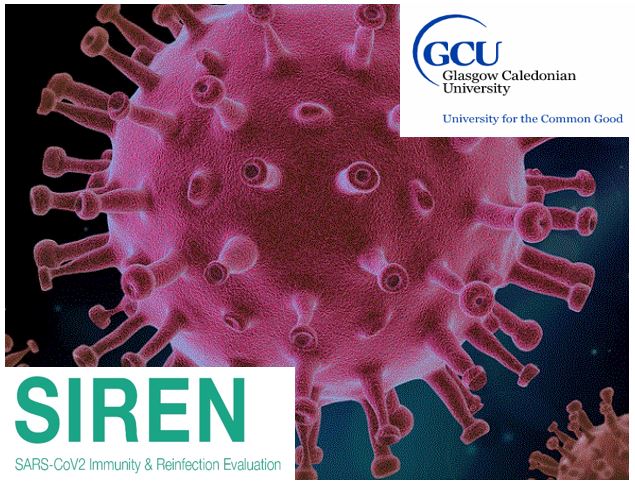By Desy Nuryunarsih and SIREN Scotland Research Team*
Our own experience of recent events tells us that the pandemic changed the way we work, live and interact with our friends, family and colleagues. The social distancing guidelines led to a more virtual existence, both personally and professionally. It was thought that people who had been exposed to SARS-CoV-2 virus would develop some immunity, and vaccination would supplement this natural immune response.

The SIREN study is a UK wide study investigating the development of SARS-COV2 immunity and the incidence of COVID-19 infection and reinfection in large cohort of healthcare workers. The study is led by Professor Susan Hopkins from the UK Health Security Agency (UKHSA).
This research aim was initially to investigate whether healthcare workers who have evidence of prior COVID-19 infection, compared to those who do not have evidence of infection, were protected from future episodes of infection.
After the rapid deployment of Covid-19 vaccines, the research aim was developed to include understanding the impact of COVID-19 vaccines on participant’s immune response and the protection provided against infection.
The SIREN study has provided insights and evidence that has informed the governments’ management of the pandemic. SIREN has now been investigating the impact of previous infection with SARS-CoV-2 and of vaccination on immunity for more than two years. Several papers have been published (1-4) but the most recent (4) demonstrates the importance of vaccination and the need for boosters. Results show that:
Among 35,768 participants, a total of 2747 primary infections and 210 reinfections were observed.
In previously uninfected participants who had received two doses of the BNT162b2 (Pfizer) vaccine the adjusted vaccine effectiveness within 14 to 73 days after the second dose was between 72% and 92%. The protection provided reached its peak in the first 2 months, and waned to between 22% and 69% after 6 months. Previous infected participants receiving two doses were found to have, no indication of waning of this protection even more than 1 year after the primary infection.
Among unvaccinated participants, participants who have been infected by SARS-COV2 had 81%-89% lower risk of infection for a year after infection compared to participants who were previously uninfected. This protection waned after 1 year of infection but remained high in participants with subsequent vaccination.
In summary, two doses of BNT162b2 vaccine were associated with high short-term protection against SARS-CoV-2 infection; this protection waned considerably after 6 months. Infection-acquired immunity boosted with vaccination remained high more than 1 year after infection.
Unvaccinated participants who had been previously infected with COVID-19 were found to have a reduced risk of reinfection for a certain time, when compared to the risk of primary infection in those who had no previous infection and were also unvaccinated.
Dual protection, however, in people who had been previously infected and subsequently double vaccinated was even greater and more durable. This protection remained strong over a year after infection and over 6 months following vaccination.
Acknowledgements
Many thanks go to the 44,500 healthcare workers who enrolled in SIREN, who have given thousands of nose and throat swabs and blood samples for analysis; without them the study would not exist; the local research teams based in 135 NHS Trust/Health Boards across the UK who have recruited participants and collected and processed the samples; the central SIREN research teams based at the UK Health Security Agency; and SIREN teams based in the devolved administration – Health and Social Care Northern Ireland, Public Health Scotland and Health and Care Research Wales. .
*The Scottish SIREN Team past and present: Desmond Areghan, Jennifer Bishop, Melanie Dembinsky, Laura Dobbie, Josie Evans, Lynne Haahr, Annelysse Jorgenson, Ayodeji Matuluko, Desy Nuryunarsih, Alexander Olaoye, Caitlin Plank, Lesley Price, Nicole Sergenson, Sally Stewart, Andrew Telfer, and Jenifer Weir.
References
- Hall VJ, Foulkes S, Saei A, Andrews N, Oguti B, Charlett A, et al. COVID-19 vaccine coverage in health-care workers in England and effectiveness of BNT162b2 mRNA vaccine against infection (SIREN): a prospective, multicentre, cohort study. Lancet. 2021;397(10286):1725-35.
- Hall VJ, Foulkes S, Charlett A, Atti A, Monk EJM, Simmons R, et al. SARS-CoV-2 infection rates of antibody-positive compared with antibody-negative health-care workers in England: a large, multicentre, prospective cohort study (SIREN). Lancet. 2021;397(10283):1459-69.
- Atti A, Ferrari M, Castillo-Olivares J, Monk EJM, Gopal R, Patel M, et al. Serological profile of first SARS-CoV-2 reinfection cases detected within the SIREN study. J Infect. 2022;84(2):248-88.
- Hall V, Foulkes S, Insalata F, Kirwan P, Saei A, Atti A, et al. Protection against SARS-CoV-2 after Covid-19 Vaccination and Previous Infection. N Engl J Med. 2022;386(13):1207-20.
To find out more about the SHIP team, head on to the GCU website, read the rest of our blogs and follow us on Twitter @SHIPGCU
Very informative, thanks for sharing